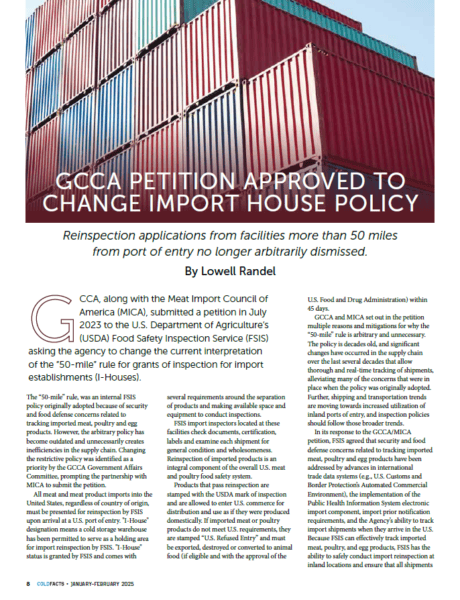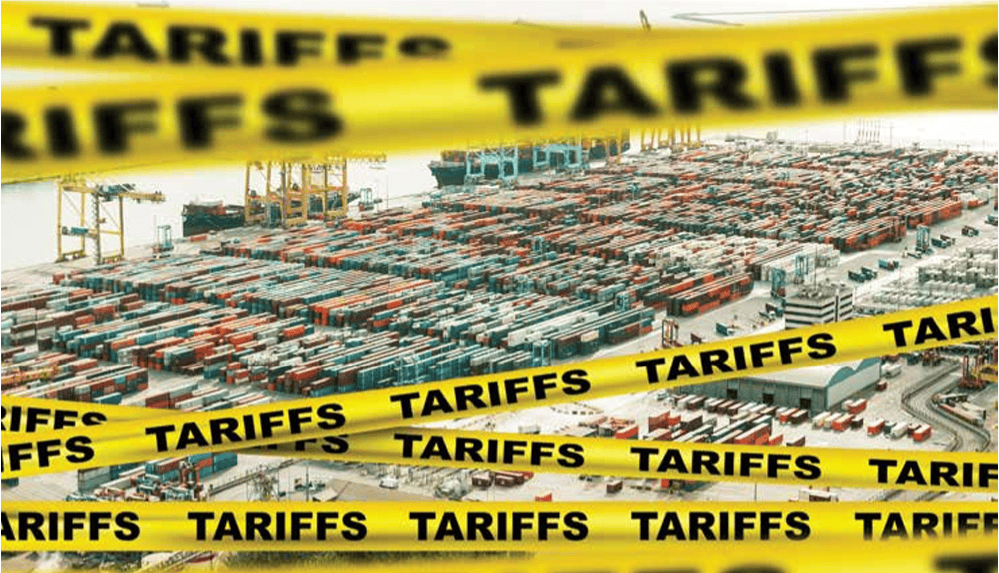From COLD FACTS Magazine (Click Image)
Read Below:
GCCA Petition Approved to Change Import House Policy
Reinspection applications from facilities more than 50 miles from port of entry no longer arbitrarily dismissed.
By Lowell Randel
GCCA, along with the Meat Import Council of America (MICA), submitted a petition in July 2023 to the U.S. Department of Agriculture’s (USDA) Food Safety Inspection Service (FSIS) asking the agency to change the current interpretation of the “50-mile” rule for grants of inspection for import establishments (I-Houses).
The “50-mile” rule, was an internal FSIS policy originally adopted because of security and food defense concerns related to tracking imported meat, poultry and egg products. However, the arbitrary policy has become outdated and unnecessarily creates inefficiencies in the supply chain. Changing the restrictive policy was identified as a priority by the GCCA Government Affairs Committee, prompting the partnership with MICA to submit the petition.
All meat and meat product imports into the United States, regardless of country of origin, must be presented for reinspection by FSIS upon arrival at a U.S. port of entry. “I-House” designation means a cold storage warehouse has been permitted to serve as a holding area for import reinspection by FSIS. “I-House” status is granted by FSIS and comes with several requirements around the separation of products and making available space and equipment to conduct inspections.
FSIS import inspectors located at these facilities check documents, certification, labels and examine each shipment for general condition and wholesomeness. Reinspection of imported products is an integral component of the overall U.S. meat and poultry food safety system.
Products that pass reinspection are stamped with the USDA mark of inspection and are allowed to enter U.S. commerce for distribution and use as if they were produced domestically. If imported meat or poultry products do not meet U.S. requirements, they are stamped “U.S. Refused Entry” and must be exported, destroyed or converted to animal food (if eligible and with the approval of the U.S. Food and Drug Administration) within 45 days.
GCCA and MICA set out in the petition multiple reasons and mitigations for why the “50-mile” rule is arbitrary and unnecessary. The policy is decades old, and significant changes have occurred in the supply chain over the last several decades that allow thorough and real-time tracking of shipments, alleviating many of the concerns that were in place when the policy was originally adopted. Further, shipping and transportation trends are moving towards increased utilization of inland ports of entry, and inspection policies should follow those broader trends.
In its response to the GCCA/MICA petition, FSIS agreed that security and food defense concerns related to tracking imported meat, poultry and egg products have been addressed by advances in international trade data systems (e.g., U.S. Customs and Border Protection’s Automated Commercial Environment), the implementation of the Public Health Information System electronic import component, import prior notification requirements, and the Agency’s ability to track import shipments when they arrive in the U.S. Because FSIS can effectively track imported meat, poultry, and egg products, FSIS has the ability to safely conduct import reinspection at inland locations and ensure that all shipments are reinspected before they enter commerce.
Going forward, instead of arbitrarily dismissing applications from facilities more than 50 miles from a port of entry, FSIS will consider factors such as:
- Availability of inspection program personnel to staff the establishment
- Expected volume of product
- Hours the establishment would be operating
FSIS will assess these factors to help ensure that potential official import inspection establishments have a consistent work schedule that would provide for the efficient and effective use of FSIS import inspection personnel.
GCCA appreciates its partnership with MICA and applauds FSIS for making this policy change. It will provide more flexibility to supply chains, reduce congestion and bottlenecks at U.S. ports of entry, increase available inspection and cold storage capacity, and provide other benefits to the increasingly overloaded import inspection system, all while protecting the safety and security of imported product.




